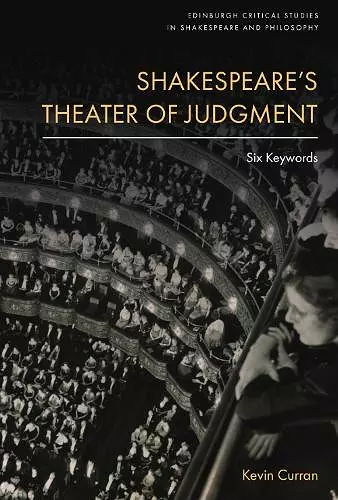Shakespeare’s Theater of Judgment
Six Keywords
Format:Hardback
Publisher:Edinburgh University Press
Published:30th Sep '24
Currently unavailable, and unfortunately no date known when it will be back

Shakespeare’s Theater of Judgment makes a case for the social and ethical importance of judgment in politics, law, art, and everyday life. It delves deep into the intellectual culture of Renaissance England and the dynamics of Shakespearean theater to recover a positive, collaborative, and future-oriented understanding of judgment, something largely lacking in contemporary social and philosophical discourse. Presenting a series of chapters organized around single keywords, the book enlists the help of Shakespeare to assemble a new lexicon for judgment, one that allows us to think and talk about our capacity for discernment in cooperative and community-making terms. Readers of Shakespeare’s Theater of Judgment will come away with a clear and urgent sense of why judgment is an indispensable component of public life, and why theater offers a particularly powerful locale for cultivating it.
Among the innovations of the Elizabethan theaters – the first such purpose-built structures in England since the time of the ancient Roman occupation – was the introduction of the box office. Performers would no longer pass the hat at the end of a performance in the hope of a generous reward. Theatergoers would now pay in advance for their entertainment, whether they judged it to their liking or not. Then, as now, at a play’s end they demonstrated their judgment in the form of applause or noises of disapproval. In this innovative study, Kevin Curran has identified and explored a concept that shaped the experience of playwrights and audiences alike. He shows the extent to which judgment – critical, punitive, just, forgiving, loving – was central to Shakespeare’s imagination and his practice. -- Stephen Greenblatt, Harvard University
In this lucid, concise and yet wide-ranging book, Kevin Curran recovers the multifariousness of judgment as vital to Shakespearean theatre. Challenging the modern association of judgment with boundary-policing and normativity, Curran shows how evaluative skills honed by early modern literary culture migrated into a theatrical practice that continues to demand creative and collective participation in the imagining of human relations, present and future. -- Lorna Hutson, University of Oxford
ISBN: 9781399516365
Dimensions: unknown
Weight: unknown
224 pages